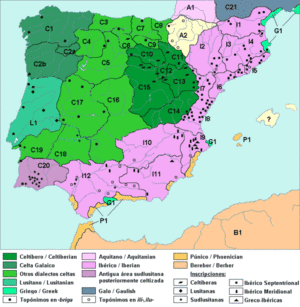-tania facts for kids
The ending -tania or -etania is used to name a place or area in the Iberian Peninsula. People from these places are sometimes called "-tanian". This ending comes from the time before the Romans arrived in Iberia. Experts who study languages are still talking about where this ending truly comes from.
One idea, from a Spanish language expert named Lorenzo Hervás y Panduro, is that it comes from Celtic languages. In Celtic, words like *tan or *taín meant "area" or "region." For example, in Irish, tan means "country" or "territory."
Other language experts, like Pablo Pedro Astarloa, think it's a mix of words. They suggest it combines the Basque ending *-eta (which means "a lot of" or "place of," like in names such as Arteta or Olleta) with the Latin ending *nia. The Latin *nia was used in place names like Romania, Hispania, and Italia.
Some old writings found on coins from the Iberian language show that people used the endings -ken or -sken to describe themselves, like in Ikalesken. This is different from the Latin-Hispanic -tanus. This makes some people think that -tania might have started with the Romans.
According to the historian Manuel Gómez-Moreno Martínez, the Latin ending -tani is similar to the Iberian -scen. For example, the Ausetanians (Ausetani) called themselves Ausesken. The Romans also used this ending for other groups of people in the western Mediterranean, like in Sardinia and Sicily. They used it less often in the Italian Peninsula, where the ending -ates was more common.
Before the Romans arrived, there were already Greek colonies in Iberia. The ancient Greeks used an older ending, -ητες (-etes), or -εται (-etai). Later, this was replaced by -ητανοι or -ετανοι (-etani), as researcher Ulrich Schmoll found in 1953.
Another idea, partly from the Aragon lawyer Joaquín Costa, connects the suffix to the Berber word *ait. This word means both "son of" and "the tribe," or to *at, meaning "people." This idea also suggests that "aide" (aita) is a related word in Basque.
Places with the -tania Ending
Many places in the Iberian Peninsula have names ending in -tania. These names often come from the ancient peoples who lived there.

C1: Galaicos / C2b: Brácaros / C3: Cántabros / C4: Astures / C5: Vacceos / C6: Turmogos / C7: Autrigones-Caristios / C8: Várdulos / C9: Berones / C10: Pelendones / C11: Belos / C12: Lusones / C13: Titos / C14: Olcades / C15: Arévacos / C16: Carpetanos / C17: Vetones / C18-C19: Célticos / C20: Conios / L1: Lusitanos / I1: Ceretanos / I2: Ilergetes / I3: Lacetanos / I4: Indigetes / I5: Layetanos / I6: Ilercavones / I7: Sedetanos / I8: Edetanos / I9: Contestanos / I10: Oretanos / I11: Bastetanos / I12: Turdetanos / G21: Galos / G1: Griegos / P1: Fenicios/Cartagineses / B1: Bereberes.
- Accitania: An area near Guadix.
- Ausetania: Now known as Osona.
- Bergistania: Today, this is Berga.
- Bastetania
- Carpetania
- Ceretania
- Contestania: Now called Cocentaina.
- Cosetania
- Ilergitania: Today, this is Lérida.
- Ilorcitania: An area around Lorquí.
- La Jacetania
- Lacetania
- Layetania
- Lusitania
- Oretania
- Ossigitania
- Sedetania
- Turdetania
Places Outside the Iberian Peninsula
The -tania ending is also found in names of places outside of Spain and Portugal.
- Aquitania (Aquitaine)
- Mauritania
- Tingitania or Transfretania
- Zeugitana or Zeugitania
- Occitania
- Arpitania: This name was made in the 1970s from "Arpes" (the Alps mountains) and -tania, like "Occitania."
- Tripolitania
See also
 In Spanish: -tania para niños
In Spanish: -tania para niños
- -land
- -stan
- -patnam
 | Selma Burke |
 | Pauline Powell Burns |
 | Frederick J. Brown |
 | Robert Blackburn |

